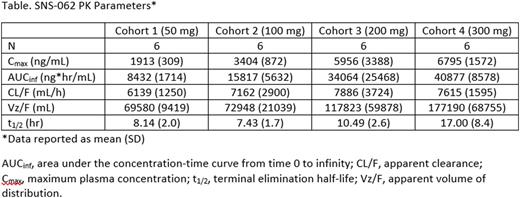Abstract
Background: SNS-062 is a potent, noncovalent (reversible) BTK inhibitor in development for B-cell malignancies and other cancers. SNS-062 has the potential for activity in patients whose cancers are sensitive to BTK inhibition, as well as those that are resistant to ibrutinib through acquisition of a BTK Cys481Ser mutation. In vitro studies have demonstrated that SNS-062 antitumor activity in cells with the mutation is unaffected (Binnerts et al, EORTC 2015, Abstract C186), in contrast to the substantially reduced activity seen with ibrutinib and acalabrutinib. This study was designed to evaluate the safety, pharmacokinetics (PK), and pharmacodynamics (PD) of SNS-062 in healthy subjects.
Methods: This was a phase 1a, first-in-human, randomized, double-blind, placebo-controlled, sequential-group, single-dose study conducted in 3 stages. In stage 1, four sequential cohorts of 8 subjects were randomly assigned to receive ascending SNS-062 dose levels (50, 100, 200, and 300 mg; n=6, 3 male, 3 female) or placebo (n=2, 1 male, 1 female) as a single dose administered orally. The primary endpoint was safety, assessed by adverse events (AEs), laboratory parameters, and cardiac monitoring. Secondary endpoints included PK parameters and PD parameters (inhibition of phosphorylation BTK [pBTK] as determined by ELISA in whole blood lysates). Stages 2 and 3 were designed to evaluate the effects of food and CYP3A4 inhibition, respectively, on the PK of SNS-062.
Results: In stage 1 (n=32), the median age was 55 years (range: 22-64) among those who received SNS-062 (n=24) and 42.5 years (range: 29-65) among those who received placebo (n=8). Treatment-emergent AEs (TEAEs) were reported for 8 (33%) subjects who received SNS-062 and for 3 (38%) subjects who received placebo. TEAEs reported for subjects who received SNS-062 included headache (n=5) and nausea, constipation, bronchitis, fatigue, orthostatic hypotension, and supraventricular tachycardia (n=1 each) without obvious evidence of dose dependency. AEs in the placebo group included headache (n=2), nausea (n=2), and diarrhea (n=1). AEs were all reported as Grade 1 except for 1 subject (who received 300 mg SNS-062) who experienced Grade 2 headache and fatigue. No Grade 3 or higher AEs and no serious AEs were reported. SNS-062 was rapidly absorbed (median Tmax: 1 hour [range: 0.5-3.0 hours]). SNS-062 concentrations declined in a multiphasic manner. Exposure increased approximately proportional to dose. Mean PK parameters for each cohort are shown in the Table. SNS-062 demonstrated rapid and near complete inhibition of pBTK at all dose levels. Stages 2 and 3 are in progress and results of the completed study will be reported at the meeting.
Conclusions: The observed safety, PK, and PD profiles of SNS-062 in this phase 1a study in healthy subjects support further clinical investigation. This study continues to evaluate the effects of food and CYP3A4 inhibition on SNS-062 PK. Mean SNS-062 exposure at 50 mg, the lowest dose level studied, exceeded those reported for ibrutinib (Imbruvica [package insert]. Sunnyvale, CA: Pharmacyclics, LLC; 2016) and acalabrutinib (Byrd et al, N Engl J Med 2016;374:323:32) when those drugs are administered at recommended dose levels. The extent of SNS-062 exposure and duration of pBTK inhibition are encouraging and support twice-daily dosing in a planned phase 1b/2 study in patients with advanced B-cell malignancies with and without the BTK Cys481-Ser mutation.
This study was sponsored by Sunesis Pharmaceuticals.
Neuman:Puma Biotechnology: Employment; Sunesis Pharmaceuticals: Employment. Ward:Sunesis Pharmaceuticals: Consultancy, Employment. Arnold:Sunesis Pharmaceuticals: Consultancy. Combs:Sunesis Pharmaceuticals: Consultancy. Gruver:Sunesis Pharmaceuticals: Employment. Hill:Sunesis Pharmaceuticals: Employment. Miller:Sunesis Pharmaceuticals: Consultancy. Fox:Amphivena Therapeutics: Consultancy, Equity Ownership, Patents & Royalties: Patent #9212225; Bispecific CD33 and CD3 Binding Proteins; Sunesis Pharmaceuticals: Consultancy, Equity Ownership, Patents & Royalties: Patent Application #20150202189; Methods of Using SNS-595 for Treatment of Cancer Subjects with Reduced BRCA2 Activity.
Author notes
Asterisk with author names denotes non-ASH members.


